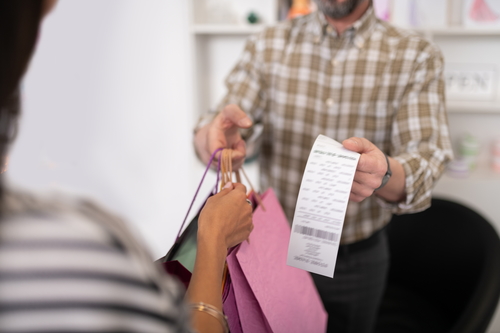Paper receipts preferred by consumers despite environmental misconceptions
A global campaign called Choose Paper has launched today which advocates consumers’ rights to continue to receive paper receipts and aims to raise awareness of their practical benefits and sustainable features.
The campaign is backed by independent research, which reveals that the majority of consumers prefer paper receipts over digital alternatives. The research, conducted by global polling company Toluna, surveyed 8,883 consumers across Europe and North America and found that 69% of UK consumers prefer paper receipts over digital alternatives and 76% believe paper receipts are more practical for returning goods.
Despite the overwhelming preference for paper receipts, many consumers are concerned about paper’s impact on the environment and underestimate the impact of digital receipts. For example, 54% of Brits believe that digital receipts are better for the environment than paper receipts and 38% believe that the sending of emails has no environmental impact. In reality, total emissions generated by worldwide emails is estimated to be 300 million tonnes of CO2 a year – equivalent to the annual emissions of 63 million cars.1
Greg Selfe, Campaign Manager for Choose Paper, said: “The environmental performance of paper manufacturers has improved significantly in the past several decades, including considerable investment into sustainable forestry practices. Sustainably managed forests breathe for the Earth, absorbing carbon dioxide from our atmosphere and producing the oxygen we require in return. By storing that carbon, forests help to regulate the global climate, absorbing nearly 40% of the fossil-fuel emissions produced by humans.2
“In considering a move to digital alternatives to paper receipts, consumers and retailers need to bear in mind that this option is not free of environmental impacts. Server farms and data centres require vast amounts of energy to operate, with many using fossil fuels as their source. As technology progresses, the demand on these data centres increases and so does the carbon footprint. In fact, the share of digital technology in global GHG emissions could reach 8% by 2025, i.e. the current share of car emissions.3,4,5 This is roughly eight times the current share of the pulp, paper and print industries.”
It isn’t just the environmental facts that the Choose Paper campaign wants to highlight to retailers and consumers. There is another issue at play - that of trust and data protection.
Nearly two thirds (64%) of UK consumers would be unhappy if stores no longer offered paper receipts, and 46% would not trust a retailer that did not offer paper receipts. Furthermore, 62% of UK consumers are concerned that their transaction history stored electronically may be used by organisations for unsolicited marketing purposes.
“Our research shows that most people do not want digital receipts. Consumers prefer and trust paper and there is the very real worry about data security that needs to be considered,” adds Greg. “Customers are only hearing one side of the argument and there is a risk that consumer choice is being taken away. Choose Paper calls upon retailers to respect their customers’ preferences and consider the environmental facts before adopting digital-only solutions.”
To find out more, go to www.choosepaper.org.
[ENDS]
Please direct any press enquiries to Emma Speirs on 01536 682800 / 07540944785 or email emma.speirs@ballyhoo-pr.co.uk. Copies of the report and supporting fact sheets are also available on request.
NOTES TO EDITORS
Photography
A stock photo is included of a shopper being handed a receipt. Photo by Shutterstock.
About Choose Paper
Choose Paper advocates for the right of consumers to receive paper receipts by educating the public about their numerous benefits, sustainability and safety.
If you would like to find out more, visit www.choosepaper.org, email Info@choosepaper.org
About the study
The survey was conducted in April 2019 by the independent research company Toluna. The survey was implemented using an online panel of 8,883 consumers across Canada, France, Germany, Italy, Spain, Sweden, the UK and the US. The sample sizes were statistically representative of age and gender in each of the surveyed markets. Phrases such as “consumers believe” or “consumers agree” are based on those respondents which either answered Strongly Agree or Agree to questions in the survey.
Sources
1. Research by Two Sides North America in 2018 based on statistics by Berners-Lee, M., 2010; Radicati Group, 2015; EPA, 2018.
2. Statistic from The Rainforest Alliance.
3. The Shift Project. 2019. The Unsustainable Use of Online Video. https://theshiftproject.org/wp-content/uploads/2019/07/2019-...
4. The Shift Project. 2019. Lean ICT. Towards Digital Sobriety. https://theshiftproject.org/en/article/lean-ict-our-new-repo...
5. Andrae and Edler. 2015. https://www.mdpi.com/2078-1547/6/1/117/ htm
